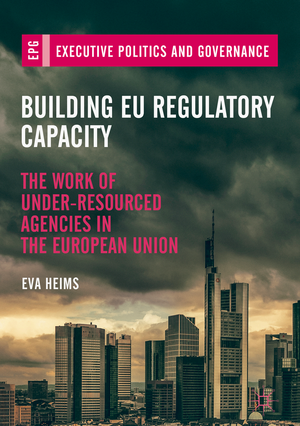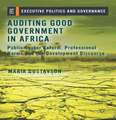Building EU Regulatory Capacity: The Work of Under-Resourced Agencies in the European Union: Executive Politics and Governance
Autor Eva Heimsen Limba Engleză Hardback – 12 oct 2018
| Toate formatele și edițiile | Preț | Express |
|---|---|---|
| Paperback (1) | 466.63 lei 6-8 săpt. | |
| Springer International Publishing – 28 dec 2018 | 466.63 lei 6-8 săpt. | |
| Hardback (1) | 471.87 lei 6-8 săpt. | |
| Springer International Publishing – 12 oct 2018 | 471.87 lei 6-8 săpt. |
Preț: 471.87 lei
Preț vechi: 555.14 lei
-15% Nou
Puncte Express: 708
Preț estimativ în valută:
90.30€ • 98.06$ • 75.85£
90.30€ • 98.06$ • 75.85£
Carte tipărită la comandă
Livrare economică 22 aprilie-06 mai
Preluare comenzi: 021 569.72.76
Specificații
ISBN-13: 9783319975764
ISBN-10: 3319975765
Pagini: 228
Ilustrații: XIII, 228 p.
Dimensiuni: 148 x 210 mm
Greutate: 0.44 kg
Ediția:1st ed. 2019
Editura: Springer International Publishing
Colecția Palgrave Macmillan
Seria Executive Politics and Governance
Locul publicării:Cham, Switzerland
ISBN-10: 3319975765
Pagini: 228
Ilustrații: XIII, 228 p.
Dimensiuni: 148 x 210 mm
Greutate: 0.44 kg
Ediția:1st ed. 2019
Editura: Springer International Publishing
Colecția Palgrave Macmillan
Seria Executive Politics and Governance
Locul publicării:Cham, Switzerland
Cuprins
1. Regulatory Capacity Building.- 2. An Organisational Perspective on Regulatory Capacity Building in the EU.- 3. Building EU Capacity to Monitor the Safety of Drugs.- 4. Building EU Maritime Safety Regulatory Capacity.- 5. Food Safety: Building EU Regulatory Capacity through the Backdoor.- 6. Building an Integrated Banking Market while Containing Cross-Border Risks.- 7. The Future of Regulatory Capacity Building in the EU.
Notă biografică
Eva Heims is Lecturer in Public Policy at the University of York, UK. She is also a research associate at the Centre for the Analysis of Risk and Regulation, LSE, UK. Dr Heims’ research in the field of public policy and administration focuses on the politics of (transnational) regulation.
Textul de pe ultima copertă
This book examines regulatory capacity beyond the nation state. It suggests that we can only understand why EU agencies are able to build EU regulatory capacity if we acknowledge that national regulators provide their expertise, staff and resources to the regulatory processes taking place in these EU bodies. This raises the puzzle of why national regulators are willing to provide ‘life support’ to potentially rival organisations. The book is devoted to answering this question in order to understand how EU regulatory capacity is created in the absence of a full supranational regulatory bureaucracy. To do so, the book studies to what extent national regulators from two countries (the UK and Germany) support EU agencies in their work across four policy sectors (drug safety, food safety, maritime safety and banking supervision). The book makes a significant contribution by developing a bureaucratic politics perspective that highlights the importance of national regulators for EU regulatorycapacity building.
Eva Heims is Lecturer in Public Policy at the University of York, UK. She is also a research associate at the Centre for the Analysis of Risk and Regulation, LSE, UK. Dr Heims’ research in the field of public policy and administration focuses on the politics of (transnational) regulation.
Caracteristici
Develops the idea that EU regulatory capacity building rests on the willingness of EU and national regulators to go above and beyond in cooperating with each other Examines what motivates national regulators to play a role in building EU regulatory capacity by devoting their expertise and staff to the work of potential rival organisations, namely EU agencies Argues that national regulators support EU agencies in their work if it helps them to tackle the key regulatory challenges they face in their domestic contexts














